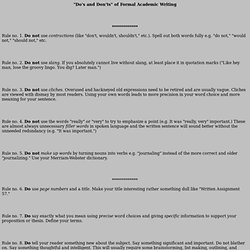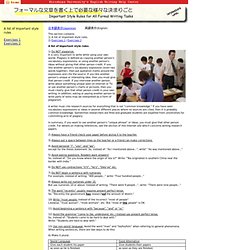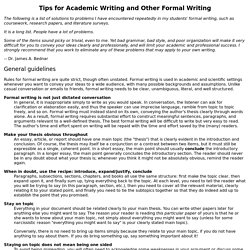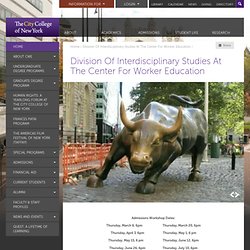

Do's and Don'ts of Formal Academic Writing. "Do's and Don'ts" of Formal Academic Writing Rule no. 1.

Do not use contractions (like "don't, wouldn't, shouldn't," etc.). Spell out both words fully e.g. "do not," "would not," "should not," etc. Rule no. 2. Rule no. 3. Rule no. 4. Rule no. 5. Rule no. 6. Rule no. 7. Rule no. 8. Rule no. 9. Rule no. 10. The views and opinions expressed in this page are strictly those of the page author.The contents of this page have not been reviewed or approved by the University of Minnesota. Some Important Rules for Writing Formal Essays. 日本語表示(Japanese) 英語表示(English) This section contains: 1) A list of important style rules. 2) Exercises 1 / Exercises 2 1) Do NOT plagiarize.

It is very important to write while using your own words. Plagiary is defined as copying another person's vocabulary expressions, or using another person's ideas without giving that other person credit. If you like another person's vocabulary expression (even two words together), then put quotation marks around the expression and cite the source. A writer must cite research sources for everything that is not "common knowledge. " In summary, if you want to use another person's "unique phrase" or ideas, you must give that other person credit. 2) Always have a friend check your paper before giving it to the teacher. 3) Always put a space between lines so the teacher or a friend can make corrections. 4) Avoid personal "I", "you", and "we", except for the thesis statement. 5) Avoid asking questions. 6) Do NOT use contractions "it'll", "he's", "they've" etc.
Www.sjsu.edu/people/jennie.luna/courses/MAS10B/s0/rules formal essay.pdf. Tips for Formal Writing, Technical Writing, and Academic Writing. Conversation is replete with ambiguous words like "this", "these", "his", "it", "they", etc.

These words have no meaning in themselves, but in conversation the meaning is usually clear from the context. In written text, however, the intended meaning is quite often not evident to the reader, because there are e.g. many possible interpretations of "it" and "this". It is a good idea to read over anything you write, searching for this sort of word.
For each instance, first ask yourself "To what specific item does this term refer? ". For such a reference to make sense, the object, person, or concept must have been explicitly mentioned just prior to your reference. Even if the item to which you refer is explicitly mentioned in your paper, ask yourself whether there is any chance that the reader might not know to which of several items you might be referring. The words "but" and "however" have similar meanings, but they are not interchangeable. Do's and Don'ts of Writing. Admissions Workshop Dates: Thursday, March 6, 6pm Thursday, March 20, 6pm Thursday, April 3, 6pm Thursday, May 1, 6 pm Thursday, May 15, 6 pm Thursday, June 12, 6pm Thursday, June 26, 6pm Thursday, July 10, 6pm Thursday, July 24, 6pm Application Deadline August 1, 2014.

The Division of Interdisciplinary Studies at the Center for Worker Education (CWE) provides an excellent education to working adults from New York City and surrounding regions. CWE serves a population that would be otherwise underserved by the college, and its courses and educational programs are specifically designed for students whose access to higher education may have been limited or interrupted due to financial limitations, work responsibilities, and family obligations. A spirit of open inquiry, curricular innovation, and academic integrity are linchpins of the CWE mission.